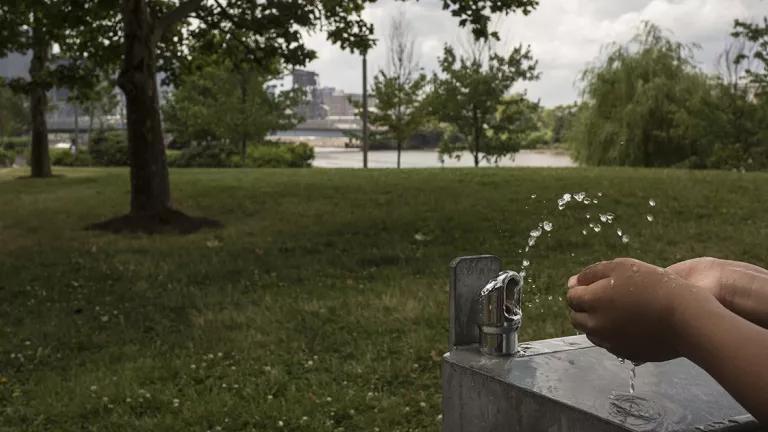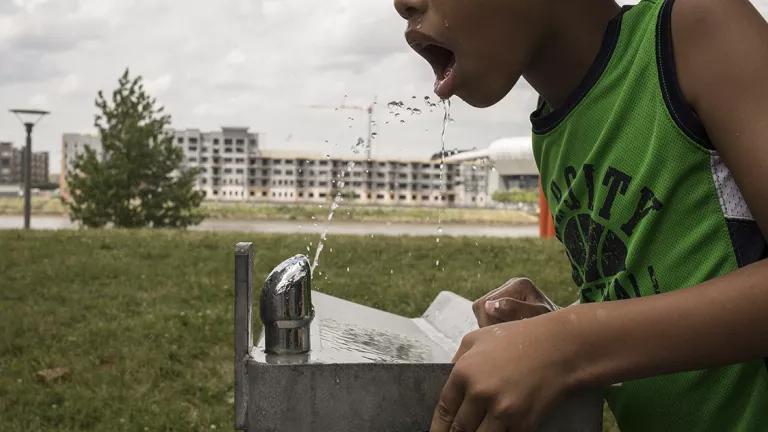Lead in Newark’s Drinking Water
According to the 2017 letter provided by the New Jersey Department of Environmental Protection, the Newark Water Department has been instructed, and is required by federal law, to undertake the following actions in response to the lead contamination issue.
Background on Lead in Drinking Water
Lead is a heavy metal that can find its way into drinking water when it dissolves or comes off in flakes from lead pipes and plumbing fixtures, especially when the water is corrosive (can erode or damage pipes). Children and pregnant women are most at risk from lead exposure.
Exposure to low levels of lead can cause serious, irreversible damage to children’s developing brains and nervous systems. Exposure to lead can also cause miscarriages and stillbirths in pregnant women, as well as fertility issues, cardiovascular and kidney effects, cognitive dysfunction, and elevated blood pressure in adults.
Federal Rules for Lead in Drinking Water
The U.S. Environmental Protection Agency’s Lead and Copper Rule regulates the presence of lead in drinking water. Under the rule, if more than 10 percent of samples test above 15 parts per billion, the federal lead “action level” is exceeded. An “action level” exceedance triggers mandatory requirements that a water system must perform. For Newark, these requirements include water quality monitoring, corrosion control treatment, source water monitoring and treatment, public education, and lead service line replacement. Newark must treat its water to guard against corrosion (pipe erosion and damage) to minimize lead “leaching” (when lead is dissolved from pipes or fixtures and transfers into the water) or flaking of small lead particles from pipes or fixtures into tap water.
Newark’s Excessive Lead Levels in its Tap Water
The Newark Water Department recently exceeded the federal “action level” for lead. New Jersey’s Drinking Water Watch database shows that Newark’s lead levels almost tripled compared to previous measurements, rising to 27 parts per billion at the 90th percentile. That is nearly twice the federal action level for lead of 15 parts per billion. The city reportedly collected 129 total water samples in first half of 2017.
Newark also had 5 addresses testing in excess of 50 parts per billion (more than 3 times the federal standard) in 2017. Testing was as high as 137 parts per billion (over 9 times the federal standard) at one Newark address. To date, despite formal open records requests, Newark and the New Jersey Department of Environmental Protection have not disclosed a comprehensive list of the addresses of homes or other locations tested.
The Newark Water Department serves a residential population of around 273,000 people. Documents provided by the New Jersey Department of Environmental Protection indicate that not all of the 129 samples that were collected from Newark homes were taken from “Tier 1” sample sites, served by a lead service line, lead pipe, or copper pipe with lead solder. Under federal rules, all of the locations counted for compliance purposes are supposed to be Tier 1 sites if available -- those at highest risk of lead contamination.
The New Jersey Department of Environmental Protection sent a letter on July 11, 2017 to the Newark Water Department that we have obtained under an Open Public Records Act request. Among other things, the NJDEP found that Newark “is out of compliance” with the rules for lead in drinking water. Newark’s water system, the letter explains, exceeds the EPA Action Level for lead, and it is “deemed to no longer have optimized corrosion control treatment” as required to minimize lead contamination.
Actions Required of Newark’s Water Department
According to the July 11, 2017 letter provided by the New Jersey Department of Environmental Protection, the Newark Water Department has been instructed, and is required by federal law, to undertake the following actions in response to the lead contamination issue:
- Conduct extensive public education about its recent lead action level exceedance by August 30, 2017, in accordance with federal regulations (40 CFR 141.85(b)(4))
- Commence replacing lead service lines immediately as required by federal regulations (40 CFR 141.84)
- Submit a list of all lead service lines in the water system and the replacement schedule to the New Jersey Department of Environmental Protection’s Bureau of Water System Engineering by September 10, 2017
- Conduct source water monitoring for lead and copper in accordance with federal regulations (40 CFR 141.88 et. seq.)
- Provide a source water treatment recommendation based on source water monitoring results to the New Jersey Department of Environmental Protection’s Bureau of Water System Engineering by December 31, 2017 (40 CFR 141.83(a); 40 CFR 141.83(b))
- Conduct water quality parameter monitoring in accordance with federal regulations (40 CFR 141.87 et. seq.)
- Submit a revised Lead and Copper Sampling Plan that complies with federal requirements to the Bureau of Water System Engineering by August 11, 2017 (40 CFR 141.86)
- Submit an optimal corrosion control treatment recommendation and supporting documents to the Bureau of Water System Engineering by December 31, 2017, that comports with federal regulations (40 CFR 141.81(e); 40 CFR 141.82(a)). The New Jersey Department of Environmental Protection has determined that Newark has not optimized its corrosion control practices
Furthermore, the Newark Water Department was required to provide a Lead Consumer Notice to any Newark residents whose homes were tested for lead under the Lead and Copper Rule within 30 days of the Department learning of the test results.
Recommendations for Newark Residents
Until Newark restores a safe drinking water source that meets EPA standards, residents are advised to take the following steps:
- Use only cold water from taps for drinking and cooking, as warm or hot water is more likely to contain higher levels of lead;
- Don’t boil your drinking water—that can concentrate the lead levels;
- Install and use water filters that are certified to remove lead by NSF International (labeled as meeting “NSF Standard 53” for lead removal—see here for a review of how to pick and operate a filter, and here for a list of filters that reduce lead levels), and regularly change the filter cartridges in accordance with manufacturer’s instructions;
- Use only filtered or bottled water to prepare baby formula and food. Children, pregnant or nursing women should also use filtered or bottled water for drinking and cooking;
- Get your tap water tested for lead. You can request a free test from the Newark Water Department (phone 973-733-6303), or if you’d prefer independent testing you can get it done by Healthy Babies Bright Futures, which lets you pay how much you can afford for the test (https://hbbf.org/lead-test-kits); and
- Consider having your child tested for lead exposure by your doctor or pediatrician.
In addition, residents should consider taking the following additional steps where possible:
- Remove and clean individual faucet aerators, as lead particles and sediment can collect in the aerator screen located at the faucets;
- Contact a licensed plumber to replace any household plumbing that may contain lead; and
- Flush cold water taps after installing any new household pipes or fixtures.
Who can I talk to about my concerns regarding the quality of my drinking water?
Contact the Newark Water Department, your councilmembers, and your mayor (Newark city government’s main number is (973) 733-6400). Express your concerns. Urge them to fix the problems and keep you informed about their progress. Contact your state and federal legislators (Newark’s federal officials are Rep. Donald Payne, 973-645-3213; Sen. Cory Booker, 973-639-8700, and Robert Menendez, 973-645-3030), and urge them to support a solution to Newark’s water problems and funding for water infrastructure improvement projects.



